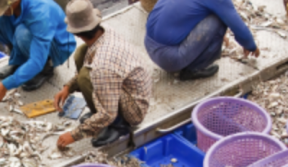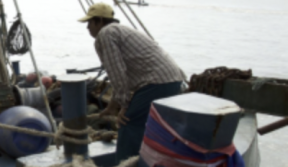Migrant fishers, working in forced labor conditions, celebrate as the EU bans products made with forced labor
BARCELONA - Migrant fishers who work on Taiwan’s distant-water fleet are attending the Seafood Expo Global (SEG) to speak out against the harrowing conditions aboard these vessels, including forced labor, physical abuse, and disappearances at sea. SEG opened on Tuesday just as the European Parliament took a momentous vote to approve a law banning products made with forced labor and today passed the Corporate Sustainability Due Diligence Directive (CSDDD), decisions with far-reaching implications for the seafood industry.
As part of the Wi-Fi NOW for Fisher’s Rights Campaign, migrant fishers, and their allies call on the world’s biggest seafood brands, retailers, and investors to support their fight for fundamental labor rights, including Wi-Fi on every vessel.
“Our fishing trips can go on for ten months without returning to port. During this time, we have no way of contacting the outside world. We are completely isolated out at sea. Work hours are brutal, and work-related accidents happen frequently due to the dangerous nature of the work and the lack of rest we get,” said Adrian, a fisher from Indonesia and member of the Indonesian Seafarers Gathering Forum (FOSPI).
"We are urging the seafood industry to act quickly as lives are at risk. We demand that seafood brands and others sourcing from Taiwan make it mandatory for vessels to provide Wi-Fi to protect fishers and the ocean," said Hadi, a leader of the Indonesian Seafarers Gathering Forum (FOSPI).
Taiwan has the second largest distant-water fishing fleet after China and exports 1 billion dollars in seafood annually to the United States, Japan, and the EU, among other markets. Factors such as isolation at sea, thin profit margins, withholding of wages, recruitment fees, excessive working hours, and crew lack of access to communication technologies such as Wi-Fi can all drive forced labor and IUU fishing.
“These two laws mark an important step towards eradicating forced labor from EU supply chains, and we’re calling for their swift and effective implementation in the seafood industry. Mandating Wi-Fi for fishers is a crucial first step for companies to conduct effective supply chain due diligence and to help eradicate forced labor, ensure labor rights, and support responsible fishing. There is no truly ‘sustainable’ seafood without labor rights for fishers. Fishers can play a foundational role in driving progress toward a sustainable seafood industry with dignity for workers and the ocean,” stated Valery Algaza, Deputy Director of Global Labor Justice-International Labor Rights Forum.
Over the past few months, migrant fishers have escalated their demands for Wi-Fi, and their cause has gained global attention. During their visit to Barcelona this week, they met with the city government of Barcelona and received full support. In March, The Guardian published an exposé that detailed labor abuses and pervasive IUU fishing in the seafood industry. A delegation of migrant fishers from FOSPI traveled to the Seafood Expo North America and received an outpouring of support from the community, followed by a trip to Washington, D.C. for meetings with the U.S. Department of Labor’s Bureau of International Labor Affairs, the U.S. Trade Representative, and members of Congress.
Migrant fishers with FOSPI also recently met with the Taiwanese government and seafood associations, as negotiations have stalled on a memorandum of understanding (MOU) to improve the rights of distant-water fishers. Following the SEG, migrant fishers and their allies will travel to Brussels to meet with The European External Action Service, the EU's diplomatic service, among others.
Wi-Fi NOW for Fisher’s Rights Campaign is an international campaign with U.S., Taiwanese, and Indonesian allies, including Indonesian Seafarers Gathering Forum, or Forum Silaturahmi Pelaut Indonesia (FOSPI), Global Labor Justice - International Labor Rights Forum (GLJ-ILRF), Taiwan Association for Human Rights (TAHR), Stella Maris Kaohsiung, Humanity Research Consultancy (HRC).
###


